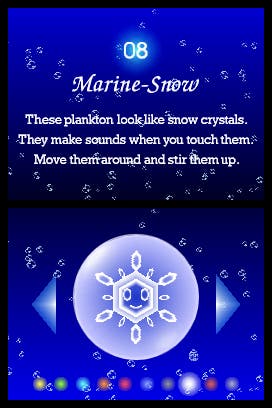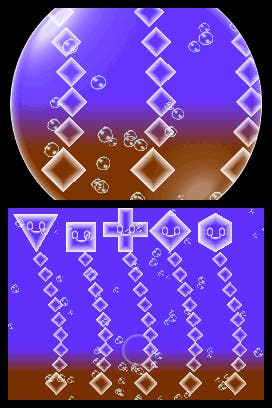Electroplankton
Some love it. Some hate it. We've got one of each.
Fishhooks!
Mobile music-making has, as you might expect, come a long way. KORG makes a beautiful machine called Pandora's Box, a fully-specced drum machine, guitar FX box and four-track recorder, and it's significantly smaller than a DS. Bjork never goes anywhere without her QY, not a water-based jelly, but a portable MIDI sequencer made by Yamaha, complete with mini rubber keyboard.
And there have been lots of attempts to transpose music-making into the platforming world. Most of them have been loop-based, and have finally allowed The People to create all the jangling Italian house piano tunes They could wish for (namely four), complete with graphics so lurid that you could actually warm your hands on them.

Electroplankton does have some loop-based features, and they're all quite distinctive. Its main thrust, though, is towards random music generation. This is a tricky one to pull off - it's very hard to strike a balance between monotonous simplicity and ear-splitting complexity. At their simplest, these programs are like windchimes, using a five-note series called the Pentatonic Scale. This is like randomly bashing the black notes on a piano - it's all relatively pleasing to the ear, but it gets boring pretty fast. And indeed the Pentatonic makes an appearance in Electroplankton, in a feature called Lumiloop, which is rather like spinning five plates.
In all the other features, though, you get a proper major scale, i.e. all the white notes on a piano. This gives you wayyy more possibilities, but it does result in more ear-jarringly painful trial-and-error. For quick gratification, you can't beat Hanebow - a surreal game where you shoot fish at a plant, playing notes as they strike each leaf. The more you strike each leaf, it turns from green to red, and the sound morphs from vibraphone to harp. Get all the leaves red at once, and - poof! - a flower appears. It's more gratifying than you might think.
Marine-Snow and Nanocarp and are incredibly random. Little water-bugs drift about the screen chaotically, each one producing a different note, and it's anybody's guess what might be where. Even if you figure out the logical scale they start out with, they'll all bugger off and you'll lose it. It's really best not to fight it. It's like having a dream or something. Just tap away and see what happens.
The Sun-Animalcule and Tracy are also hard, but there is some method to the music. After a while you'll get a feel for what works best, and how to build a nice chord or two. Luminaria is a huge pain in the arse. Once I'd figured out what notes were where, I could start to put something together, but for a long time it was like standing in the middle of the front door section of B&Q, with a coachload of schoolchildren testing all the doorbells at once.

There's some great loop-based fun to be had. Rec-Rec lets you multi-track your own voice, ukulele, cat, or whatever you have to hand, and you can build some really nice riffs. And Beatnes lets you make up some wicked old-school beats with all your favourite (strangely SEGA-esque) 16-bit sounds. It's a shame they didn't allow you to build your own backing track too... You could build some fantastic loops to incorporate into songs if you could build the loops from scratch. Everybody would be sticking a little 16-bit break into their demos before long.
Incidentally, the sound quality on the whole is pretty good. It sounds like an FM-synth - not dissimilar to the Yamaha QY series or the Tascam Pocketstudio 5, and manages to avoid the out-and-out cheesiness of bad samples very well. The sampling quality from the microphone is not brilliant, but it does the job. It does sort of suck that you can't save your work. But you can always dump stuff out to any kind of recording device by sticking a cable in the headphone socket and plugging it into the line-in on your mp3 player / good-for-nothing minidisc deck / hilarious old-days cassette recorder.
Something I would have liked to see would have been a greater variety of scales or keys. Everything is in the same one major scale. A minor or a blues scale would have been really interesting in one or two of the games, and would have created a much more colourful tonal palette.
Electroplankton is not a composing tool. It's more like a musical zen-garden. Almost everything you create within the game will fade away or evolve into something different. But there's a joy to that. It forces you to let go, and free your mind. It isn't a program that will let you realise your musical ideas. But it will give you musical ideas you never ever could have dreamed up without it. I love it. It's one of those things you can imagine switching on and then drifting in and out of consciousness listening to until 4am. It feels, like composing, very personal, and very intimate. And sometimes... a bit mad.
Jake Yapp
Electoplankton is due out in Europe on April 21st.
